College of Medicine Research
Leading innovations through research
Since its foundation in 2009, the College of Medicine strives to be a national leader in the pursuit of basic, translational, clinical, medical education and population health research. We aim to develop programs to advance medical and scientific knowledge and improve patient care and community wellness. The ultimate goal is to contribute to the health of the public, the practice of medicine and the education of health professionals; all while promoting the development of academically oriented physicians.





Research areas
Research is an important mission of the CMU College of Medicine. We have nationally recognized investigators advancing the understanding of health sciences across a broad continuum of research types.
- Basic - Investigative research that advances our scientific understanding of issues affecting health.
- Translational - Research that applies the discoveries made by basic research investigators to studies with patients or to best practices in the field of medicine.
- Clinical - Medical research directly or indirectly involving patients that seeks to better understand and manage human illnesses.
- Population Health/Health Services - Research that examines the health care system and access to care, and the effect that care has on patients.
- Medical Education - The systematic study and
investigation of various aspects related to the education and training
of health care professionals, particularly those in the field of
medicine. This type of research aims to enhance the quality,
effectiveness, and outcomes of medical education programs, curricula,
teaching methodologies, and assessment methods.
Our facilities
Research Lab - Denison Drive, Mount Pleasant
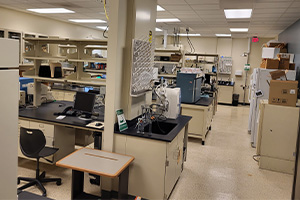 For the purpose of basic and translational research, the College of
Medicine offers a 12,600 square foot, state-of-the-art research facility
that holds up to eight faculty labs. This Research Lab is located on
Denison Drive in Mount Pleasant.
For the purpose of basic and translational research, the College of
Medicine offers a 12,600 square foot, state-of-the-art research facility
that holds up to eight faculty labs. This Research Lab is located on
Denison Drive in Mount Pleasant.
The facilities feature shared cell culture facilities and a small
rodent vivarium along with shared molecular and cellular biology
equipment.
The Research Lab also
houses wet labs for the following faculty members.
Jesse Bakke, Ph.D.
Stave Kohtz, Ph.D.
Edward McKee, Ph.D.
Rosemary Poku, Ph.D.
Mariana Rosca, Ph.D.
Brain
Research and Integrative Neuroscience (BRAIN) Center - Herbert H. and
Grace A. Dow College of Health Professions, Mount Pleasant campus
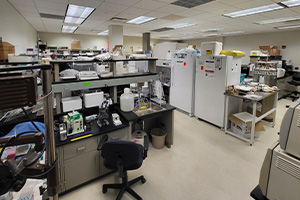 Three
of our faculty are neuroscientists housed in the Health
Professions Brain Research and Integrative Neuroscience (BRAIN) Center
located on the second floor of the Herbert H. and Grace A. Dow College
of Health Professions building on the Mount Pleasant campus. The BRAIN
Center is equipped with a vivarium, cell
and live animal imaging equipment, and shared resources for behavioral
analysis. This is also home to a complete automation suite including
automated liquid handling, microscopy and DNA/RNA synthesis and cloning
for molecular and synthetic biology.
Three
of our faculty are neuroscientists housed in the Health
Professions Brain Research and Integrative Neuroscience (BRAIN) Center
located on the second floor of the Herbert H. and Grace A. Dow College
of Health Professions building on the Mount Pleasant campus. The BRAIN
Center is equipped with a vivarium, cell
and live animal imaging equipment, and shared resources for behavioral
analysis. This is also home to a complete automation suite including
automated liquid handling, microscopy and DNA/RNA synthesis and cloning
for molecular and synthetic biology.
The BRAIN Center houses labs for the following faculty members.
Ute Hochgeschwender, M.D.
Eric Petersen, Ph.D.
Julien Rossignol, Ph.D.
Biosciences Building - Mount Pleasant campus
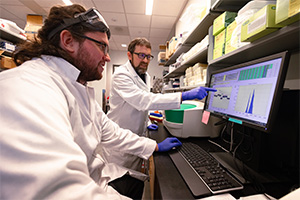 Michael J. Conway, Ph.D. and his laboratory are housed in the
multidisciplinary Biosciences Building. He works on emerging infectious
diseases with a focus on wastewater surveillance of SARS-CoV-2,
Respiratory Syncytial Virus, and Norovirus, and also vector-borne
diseases such as dengue virus and Zika virus. See Conway Research.
Michael J. Conway, Ph.D. and his laboratory are housed in the
multidisciplinary Biosciences Building. He works on emerging infectious
diseases with a focus on wastewater surveillance of SARS-CoV-2,
Respiratory Syncytial Virus, and Norovirus, and also vector-borne
diseases such as dengue virus and Zika virus. See Conway Research.
Foust Hall - Mount Pleasant campus
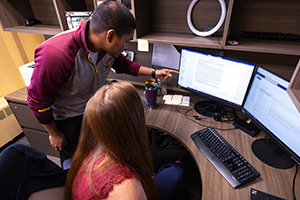 The CMU College of Medicine Population Health Research Group is
located within Foust Hall. Some in this group also conduct medical
education research. The CMU College of Medicine Population Health
Research Group consists of the following faculty members.
The CMU College of Medicine Population Health Research Group is
located within Foust Hall. Some in this group also conduct medical
education research. The CMU College of Medicine Population Health
Research Group consists of the following faculty members.
Beth Bailey, Ph.D.
Samantha Hahn, Ph.D.
Neli Ragina, Ph.D.
College of Medicine Main Building - Mount Pleasant campus
The faculty focused on medical education and healthy aging research have offices located on the first and second floor of the College of Medicine Educational Building in Mt. Pleasant.
These research groups consists of the following faculty.
Harold Bell, Ph.D.
Joydeep Chaudhuri, M.D.
Michael Elftman, Ph.D.
Brianne Lewis, Ph.D.
Kenneth Lewis, Ph.D.
S. Sethu Reddy, M.D.
College of Medicine Saginaw Education Building - Saginaw campus
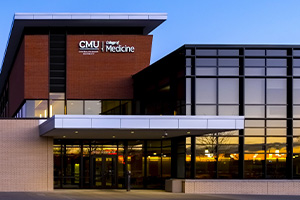 CMU College of Medicine faculty and affiliated clinicians are also
involved with investigator-initiated clinical research as well as
pharma-sponsored clinical trials in collaboration with providers from
various health care systems in the Saginaw area and beyond. Faculty
involved in clinical research and clinical trials in Saginaw include
Nawar Hussin, M.D. and Neli Ragina, Ph.D.
CMU College of Medicine faculty and affiliated clinicians are also
involved with investigator-initiated clinical research as well as
pharma-sponsored clinical trials in collaboration with providers from
various health care systems in the Saginaw area and beyond. Faculty
involved in clinical research and clinical trials in Saginaw include
Nawar Hussin, M.D. and Neli Ragina, Ph.D.
Central Michigan University College of Medicine/University Pediatricians Clinical Research Institute
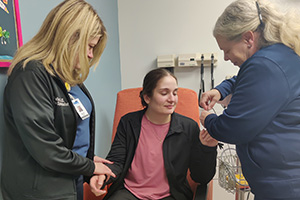 The Central Michigan University College of Medicine/University Pediatricians Clinical Research Institute (CRI) meets a significant need for Michigan’s children―pediatric clinical and translational research. Our mission and vision are to serve as a nationally and internationally recognized preeminent center of excellence for pediatric research that will advance clinical care, provide children and their families with access to state-of-the-art treatment options, and improve the lives of children both locally and globally.
The Central Michigan University College of Medicine/University Pediatricians Clinical Research Institute (CRI) meets a significant need for Michigan’s children―pediatric clinical and translational research. Our mission and vision are to serve as a nationally and internationally recognized preeminent center of excellence for pediatric research that will advance clinical care, provide children and their families with access to state-of-the-art treatment options, and improve the lives of children both locally and globally.
Our physician-investigators are on the cutting-edge of medicine. Through partnerships with investigators at Central Michigan University College of Medicine and with collaborators at local, national and international institutions, the CRI seeks to shape clinical practice for our pediatric populations.
The CRI provides infrastructure support for our physician-investigators through mentorship and education, grants administration, regulatory management, as well as hands-on support for study design and, execution together with data management and analysis.
The Central Michigan University College of Medicine/University Pediatricians Clinical Research Institute gratefully acknowledges the generous support provided by The Children’s Foundation, the Festival of Trees and the Evergreen Endowment.
